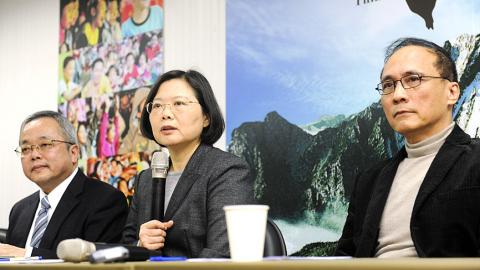Take the egos and the politics out of cross-strait exchanges and focus on what is right and good, former Democratic Progressive Party (DPP) chairperson Tsai Ing-wen (蔡英文) said yesterday.
Tsai said exchanges across the Taiwan Strait should not be dominated by specific political parties and individuals.
“Hopefully, our exchange visit will establish a new model for future engagement ... and both sides [of the Taiwan Strait] should ditch the past model of exchange that was exploited by a selected few with a limited perspective,” she told a press conference.

Photo: George Tsorng, Taipei Times
Tsai was briefing the media about a delegation organized by her Thinking Taiwan Foundation, which had visited China for a five-day academic exchange on economic issues.
The nine-member delegation led by Lin Chuan (林全), executive director of the foundation and a former minister of finance, focused exclusively on trade and economic policy, without the involvement of businesspeople or meetings with Chinese officials, she said.
Tsai said she insisted on “multi-layered, multi-faceted and diverse” bilateral exchanges that were based on professional expertise, rather than political considerations.
However, Tsai reiterated that she currently has no plan to visit China, adding that she would only do so if her visit was beneficial to Taiwanese interests and to cross-strait stability.
Lin said the visit has been “fruitful” and “sincere” in exchanging views and opinions on a variety of economic issues, reiterating that it was a “return visit” for the attendance of two prominent Chinese economists — Bank of China chief economist Cao Yuanzheng (曹遠征) and Ding Zhijie (丁志杰) of the University of International Business and Economics — at an event organized by the foundation in July last year.
The delegation visited 13 institutions, some of them government agencies, and private companies for an insight into the Chinese economy, the challenges it faces and the reform plan that was unveiled in the Chinese Communist Party third plenum, Lin said.
In some ways, China and Taiwan are tackling the same problems, such as industrial upgrades and further market liberalization, he said, adding that China had paid a dear price for its failure to balance economic development and environmental protection.
Experts in the delegation, among them two former Financial Supervision Commission chairmen, Hu Sheng-cheng (胡勝正) and Shih Chun-chi (施俊吉), offered their experience on banking deregulation to their Chinese counterparts, Lin said.
Lin said Chinese academics were also keen to understand more about Taiwan’s economic policy and challenges.
Asked if the Chinese side had brought up the controversial cross-strait service trade agreement and the follow-up trade in goods agreement, which is still under negotiation, Lin said several academics privately asked about it.
“Nothing about the content was mentioned, but we did advise Beijing to understand why the pact has been seen as a serious concern to Taiwanese. We also told them what our concerns are,” Lin said.
Shih summed up the benefits of the trip as discussions and on-site inspection that enabled better understanding of China’s banking policy, macroeconomic policy, the methodology and processing of its statistics and economic accounting, operation of its electronic and communication industry, such as computer manufacturer Lenovo and search engine Baidu, as well as China’s efforts on free-trade zones in Tianjin.
In the question-and-answer session, Tsai was asked about reports of her entering the DPP’s chairperson election in May.
“It’s still too early to tell. I have not given it a lot of thought, but the decision will depend on how the situation develops and evolves,” she said.

Taiwan would welcome the return of Honduras as a diplomatic ally if its next president decides to make such a move, Minister of Foreign Affairs Lin Chia-lung (林佳龍) said yesterday. “Of course, we would welcome Honduras if they want to restore diplomatic ties with Taiwan after their elections,” Lin said at a meeting of the legislature’s Foreign Affairs and National Defense Committee, when asked to comment on statements made by two of the three Honduran presidential candidates during the presidential campaign in the Central American country. Taiwan is paying close attention to the region as a whole in the wake of a

President William Lai (賴清德) has appointed former vice president Chen Chien-jen (陳建仁) to attend the late Pope Francis’ funeral at the Vatican City on Saturday on his behalf, the Ministry of Foreign Affairs said today. The Holy See announced Francis’ funeral would take place on Saturday at 10am in St Peter’s Square. The ministry expressed condolences over Francis’ passing and said that Chen would represent Taiwan at the funeral and offer condolences in person. Taiwan and the Vatican have a long-standing and close diplomatic relationship, the ministry said. Both sides agreed to have Chen represent Taiwan at the funeral, given his Catholic identity and

Chinese Nationalist Party (KMT) Chairman Eric Chu (朱立倫), spokeswoman Yang Chih-yu (楊智伃) and Legislator Hsieh Lung-chieh (謝龍介) would be summoned by police for questioning for leading an illegal assembly on Thursday evening last week, Minister of the Interior Liu Shyh-fang (劉世芳) said today. The three KMT officials led an assembly outside the Taipei City Prosecutors’ Office, a restricted area where public assembly is not allowed, protesting the questioning of several KMT staff and searches of KMT headquarters and offices in a recall petition forgery case. Chu, Yang and Hsieh are all suspected of contravening the Assembly and Parade Act (集會遊行法) by holding

Lawmakers from the Democratic Progressive Party (DPP) yesterday established a friendship group with their counterparts in Ukraine to promote parliamentary exchanges between the two countries. A ceremony in Taipei for the Taiwan-Ukraine Parliamentary Friendship Association, initiated by DPP Legislator Chen Kuan-ting (陳冠廷), was attended by lawmakers and officials, including Deputy Minister of Foreign Affairs Francois Wu (吳志中) and European Economic and Trade Office in Taiwan Director Lutz Gullner. The increasingly dire situation in Ukraine is a global concern, and Taiwan cannot turn its back when the latter is in need of help, as the two countries share many common values and interests,